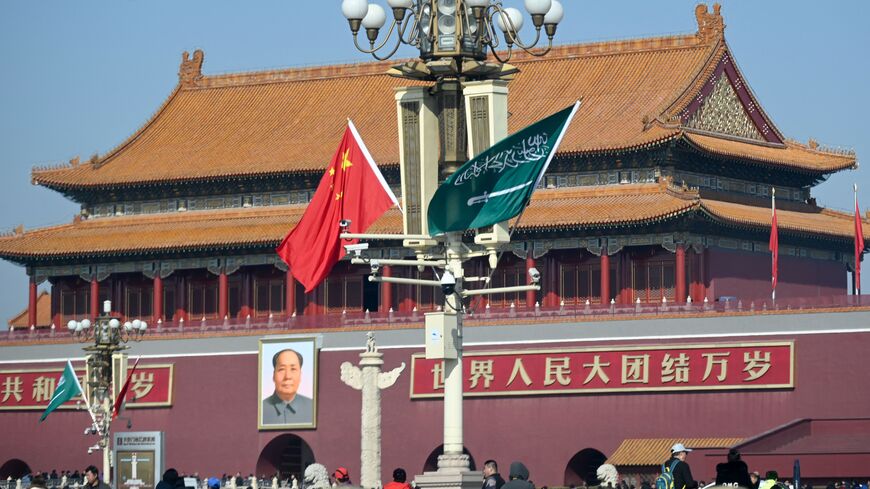DUBAI — Saudi Arabia's Cabinet approved a decision Wednesday to join the Shanghai Cooperation Organization (SCO), inching another step closer to China despite concerns from its traditional ally, the United States.
The memorandum awards the kingdom the status of dialogue partner in the SCO, a political and security union that spans Eurasia and includes China, India and Russia. The SCO is seen as a geopolitical counterweight to the United States and Western powers.
The body was created in 2001 to counter US hegemony in the region, and it expanded later to include India and Pakistan. Iran also joined the union with full membership last year.
The decision by Saudi Arabia to join and acquire dialogue partner status was discussed during the visit of Chinese President Xi Jinping to the kingdom in December, according to Reuters' sources, who reported that this first step is expected to lead to full membership.
Riyadh’s growing ties with Beijing have raised concerns with Washington and gained momentum in recent months.
Emily Hawthorne, a senior Middle East analyst at the US-based Risk Assistance Network and Exchange, does not see this move as Saudi Arabia choosing a side but rather it not picking one.
“It’s really important to not view this as [the kingdom] abandoning or purposefully weakening any ties to the United States,” she said, adding that Washington remains Riyadh’s main security guarantor.
Saudi Arabia is seemingly looking to diversify its global partnerships in the same way that it has been diversifying its economy into non-oil sectors and reducing its dependence on one single source.
The SCO, founded about 22 years ago, is still young compared to its almost 74-year-old Western counterpart, the North Atlantic Treaty Organization, or NATO.
Hawthorne said that while security is the key goal of both organizations, the SCO still doesn’t carry the same security and military weight as NATO.
“It operates more as a forum for dialogue between Eurasian countries that have common interests. A non-alignment to the Western, or US-led, world order,” she told Al-Monitor. That said, she added, the SCO’s main goal is security and its members will be conducting joint military drills with the goal of being able to fight on the same side in the far future.
Saudi Arabia continues to maintain strong security ties with the United States, particularly when it comes to arms acquisitions. The United States, the world’s top arms exporter, was the largest exporter to the Middle East and North Africa and accounted for 54% of weapons sold to the region from 2018 to 2022, according to a report published by the Stockholm International Peace Research Institute.
By joining the SCO, Saudi Arabia's security relationship with China is currently blossoming. But this relationship is nothing new and stems back decades before.
The US-China Economic and Security Review Commission identifies ballistic missile sales from China to Saudi Arabia as far back as the 1980s, with reported sales in 1992, 2007 and 2014.
In 2021, the kingdom imported sensitive missile technology from the Chinese military to manufacture its own ballistic missiles, according to The Wall Street Journal.
Hawthorne said that the kingdom has been asking for more advanced technology from the United States and will diversify its sources to get it.
“Western-made equipment is still going to fit the bill for a lot of what Saudi Arabia needs. But drones and planes that aren't the latest fifth generation jets and the like — Saudi Arabia can get those at a much better price from countries like China, South Korea, Turkey and Russia,” she told Al-Monitor.
This is going to be an increasing source of concern for Washington, Hawthorne added. She said that the US strategy at the moment is to withdraw from the Middle East to better address domestic issues and competition with China. Yet if China is increasingly active in the region, with Gulf countries in particular, the United States might have to ask itself if it will reinstate, or increase, its presence in the region.
“I don’t think there’s an answer to that yet. I believe that’s something actively being discussed in Washington right now,” she added.
Earlier this week, Saudi Aramco signed two deals to build a major refining and petrochemical complex in China valued in the billions of dollars.
Nearly three weeks ago on March 10, a surprise deal between Saudi Arabia and Iran took place ending seven years of political conflict, which was brokered by China.
These growing ties became visually apparent with President Xi’s three-day visit to the kingdom’s capital in December, the first time in nearly seven years that China's president has visited its key energy ally.
Saudi Arabia, the world’s largest crude supplier, and China, the biggest energy consumer, met to discuss their ambitions for an initial agreement of $29.26 billion.
The United States was Riyadh’s largest trading partner at $76 billion in 2012, but now China, India and Japan have surpassed the United States, with which trade was only $29 billion in 2021, according to Bloomberg.


.jpg?h=484aaada&itok=l9O0K7bm)




